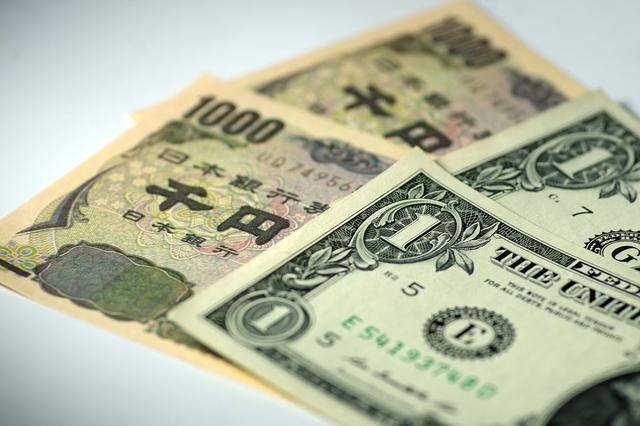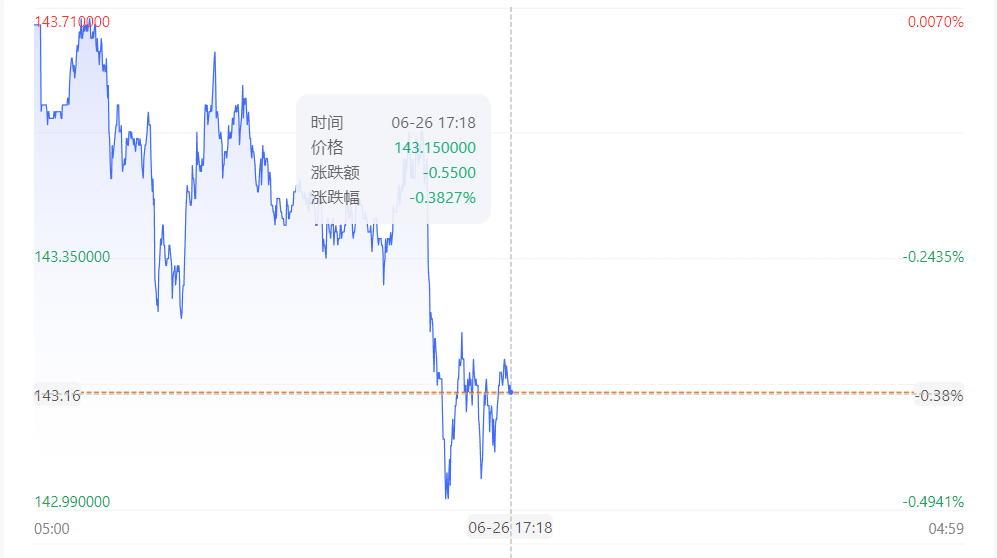Bank of Japan members call for early adjustment of YCC yen depreciation when to stop?
On June 26, the summary of the June meeting of the Bank of Japan Review Committee showed that Japan continued to maintain its easing policy and did not make operational adjustments to the yield curve control (YCC) policy.。But there is one point in this summary that is different from the past - one of the nine Board members of the Bank of Japan calls for an early revision of Japan's controversial YCC policy.。
On June 26, the summary of the June meeting of the Bank of Japan Review Committee showed that Japan continued to maintain its easing policy, while focusing on side effects, as long-term price risks were biased to the downside.。As the yield curve shape distortion problem has been resolved, there is no need to make operational adjustments to the yield curve control (YCC) policy。
But there is one point in this summary that is different from the past - one of the nine Board members of the Bank of Japan calls for an early revision of Japan's controversial YCC policy.。
The member said: "The central bank should maintain the overall framework of monetary easing for the time being.。"He went on to say, but given the need to prevent large fluctuations in interest rates if the current monetary policy is to be withdrawn in the future, a revision of the YCC's treatment should be discussed as soon as possible.。
Although analysts believe this currently reflects only a minority view of the BOJ board, the market is watching to see if similar such comments will be repeated in the near term, as this could signal a shift in policy and the BOJ's ultra-loose money could be at a crossroads.。
Notably, this is the first time in the BOJ summary that board members have explicitly mentioned the need for an early debate on the YCC's adjustment, in stark contrast to remarks by BOJ Governor Kazuo Ueda to rule out any impending policy changes.。
Daisaku Ueno, chief currency strategist at Mitsubishi UFJ Morgan Stanley Securities, said: "Although only one member called for reforms to the YCC, we still need to see if other members, including Ueda and Tsuo, will follow suit.。If other members follow, it will be a major adjustment (of the Bank of Japan).。"
Ignoring market doubts, Ueda and Male continue to "sit firmly on Taishan."
Starting in 2013, in order to reverse Japan's low inflation rate and economic growth rate, Japan launched a massive economic stimulus, and the YCC policy came into being.。Under the YCC policy framework, the Bank of Japan keeps short-term interest rates at -0.1%, while the 10-year Treasury yield is kept near 0% through large purchases of Treasuries.。
But Japan's ultra-loose monetary policy has not had the desired effect in terms of inflation and economic growth over the past decade.。Not only that, the central bank's balance sheet has increased significantly and the yen has depreciated significantly。
Although the market for YCC policy doubts have not been broken, but the Bank of Japan has been "stable," continue to implement the ultra-loose monetary policy。It wasn't until last December that the incoming Bank of Japan governor Haruhiko Kuroda suddenly announced that he would raise Japan's 10-year bond yield to zero..About 5%, is the previous 0.Twice the 25% cap, a statement that directly caught the market off guard。There has been much speculation about whether the move will be the end of Japan's ultra-loose policy.。Masamichi Adachi, chief Japan economist at UBS Securities and a former Bank of Japan official, said at the time: "No matter what the Bank of Japan explains, this is a step towards an exit (easing).。This leaves the door open for a rate hike after the new governor takes office in 2023。"
In May of this year, the dust settled on the new governor of the Bank of Japan, officially succeeded by Kazuo Ueda for a five-year term.。To the outside world's concerns about easing, Ueda gave his answer: given the current economic, price and financial conditions, it is appropriate to maintain the existing yield curve control policy.。He believes that the Japanese economy is not yet in a state where it needs to raise interest rates significantly, and that negative interest rate policy is the basis for current monetary easing, so it is appropriate to maintain negative interest rates for now。
However, Ueda and Nan also left "room" for adjusting monetary policy.。He said it would be difficult for monetary policy alone to boost long-term economic growth, and the Bank of Japan could re-examine overall policy in the long term。
Since then, there has been news that the Bank of Japan will make YCC policy adjustments, but Ueda did not make other moves。The latest summary of the June meeting shows that Ueda and Male are still choosing to go conservative。
When will the depreciation of the yen stop??
The controversial point of YCC policy is also its impact on the yen exchange rate.。Some analysts blame the YCC for causing the yen to depreciate, pushing up the cost of raw material imports。
The yen has come under pressure again in recent weeks as investors focus on the contrast between the Bank of Japan's extreme dovish stance and other countries' hawkish central banks。On Friday, the yen hit a more than seven-month low against the dollar, reaching 143.87。The yen, often seen as a safe-haven asset, is now under increasing selling pressure。
And the pressure to depreciate the yen comes not only from Japan's domestic easing policy.。
Japan's trade deficit hit 1 in May, according to public data.37 trillion yen, which is Japan's 22 consecutive months of trade deficit since August 2021。A persistent and large trade deficit is exacerbating the depreciation of the yen.。
In addition, over the past year, including the Federal Reserve, a number of central banks around the world to open the "interest rate hike cycle," but Japan due to the weakness of the domestic economy and other reasons to continue to maintain loose monetary policy, resulting in the rapid expansion of the spread between the yen and the dollar and other major currencies, the yen has depreciated significantly.。Meanwhile, there has been an upward cycle in international energy prices since 2021, but Japan's import costs have soared as its economy is highly dependent on external commodities。Higher import prices overlaid with a weaker yen, which in turn has led to a widening of Japan's trade deficit。The depreciation of the yen is in an endless cycle.。
Today, Masato Kanda, Japan's top diplomat for monetary affairs, stepped up his warning against the devaluation of the yen, sending a signal to the market that the Japanese authorities will not rule out any appropriate option to deal with excessive exchange rate fluctuations.。Asked if the authorities were ready to intervene in the market, Mr Kanda said: "We have all the options and we don't rule out any.。The last time the Japanese government intervened against the yen was last October, when the yen fell to around 152 yen against the dollar, hitting a 32-year low.。
But there were also Japanese officials who came out to "appease people."。Japan's finance ministry undersecretary for international affairs said the currency should move steadily after the yen fell below 143 yen to a seven-month low against the dollar on Friday and the yen fell to a 15-year low of 155 yen against the euro, reflecting fundamentals.。

Perhaps seeing the unsustainability of YCC policy, there are already institutions in the market betting that the Bank of Japan will adjust its easing policy in July。Such as expanding the easing range set around the 10-year Treasury yield target to address the market distortions caused by its huge bond purchases.。
M & G Investments, which oversees $366 billion, is one of the agencies betting on Japan's policy shift, and it is also doing yen buying。Jim Leaviss, chief investment officer of the agency's public fixed income division, said the Bank of Japan could remove interest rate curve controls at any time now because the fundamentals of the Japanese economy now allow for the removal of interest rate curve controls.。
According to Levis, the yen is currently low, and it is easier and more cost-effective to buy the yen to bet on a shift in Bank of Japan policy than to short Japanese government bonds.。He noted that Japan's wage growth and annual salary negotiations earlier this year, among other things, showed that the Japanese economy was not stagnating as widely believed, while he predicted that the Japanese economy would experience both economic growth and inflation.。So the Bank of Japan may gradually reduce the size of its ultra-loose monetary policy to cope with future economic growth and inflation.。
In addition, institutions such as Goldman Sachs, BNP Paribas and JPMorgan Chase have similar views that the Bank of Japan will make policy adjustments at its July meeting.。Joyce Chang, chairman of global research at JPMorgan, said Japan is expected to exit its yield curve control policy in the coming months.。
Dollar slips 0 on day against yen as of press time.38%, at 143.15。

·Original
Disclaimer: The views in this article are from the original Creator and do not represent the views or position of Hawk Insight. The content of the article is for reference, communication and learning only, and does not constitute investment advice. If it involves copyright issues, please contact us for deletion.